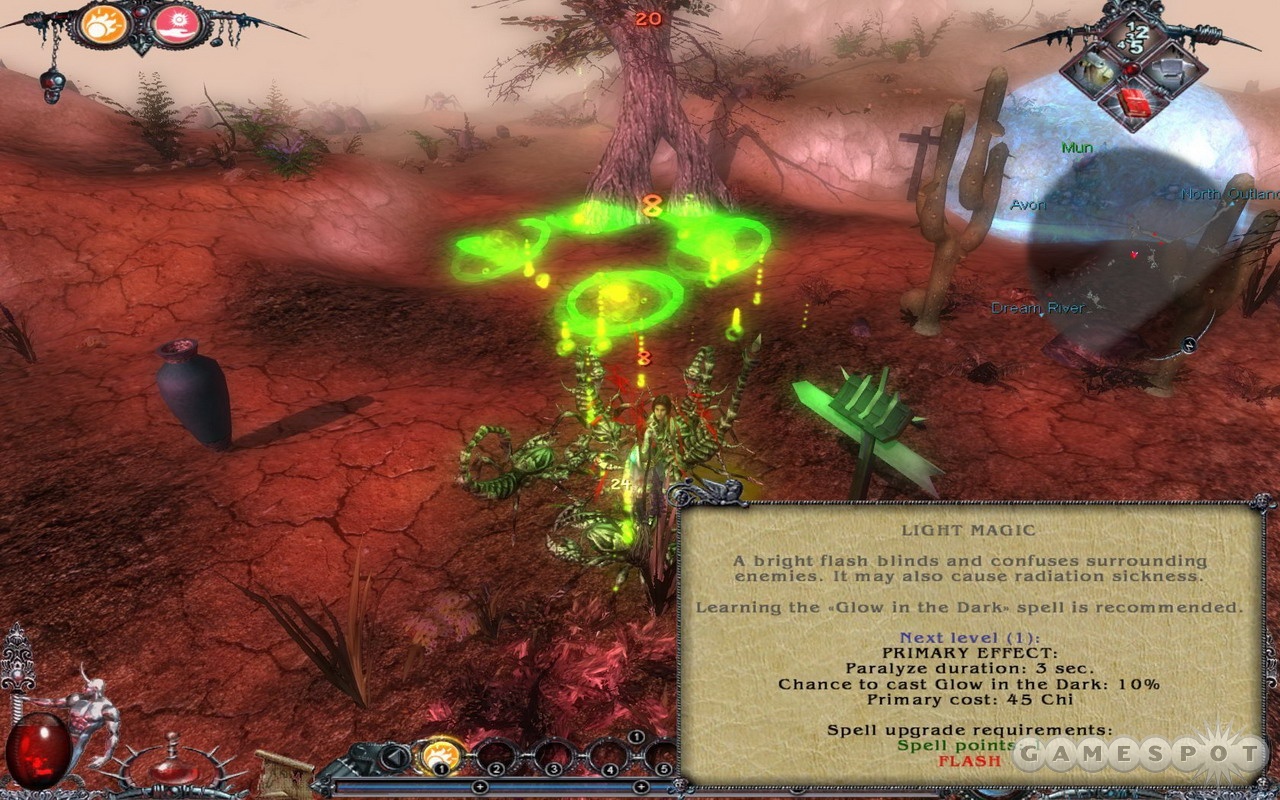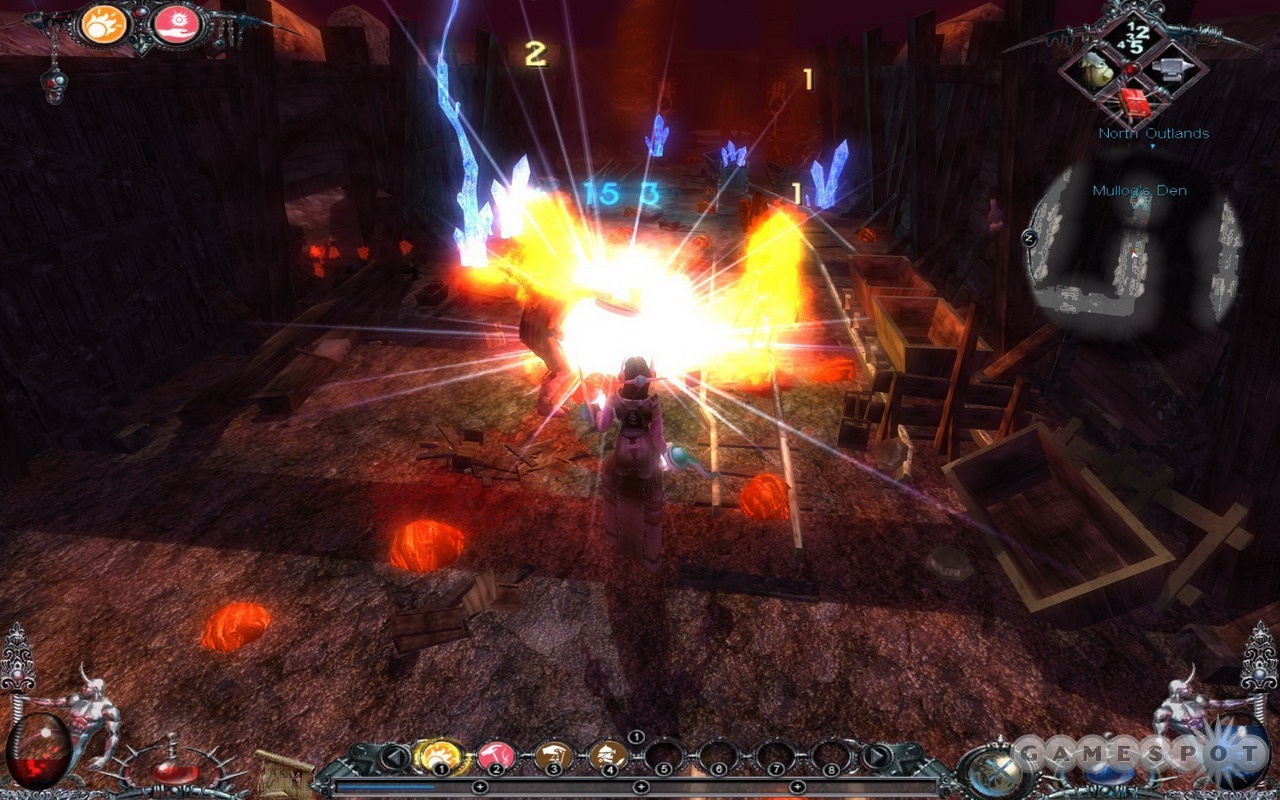All of the extra hocus-pocus in Dawn of Magic should have made it a cut above the typical Diablo clone. While the standard action role-playing game contents itself with nonstop hacking and slashing, this one from developer Sky Fallen Entertainment gives you all of that twitchy-fingered goodness along with a dozen magical schools that let you raise the dead, launch fireballs, and even suck the blood out of enemies. But all of this Harry Potter stuff is worthless in the end because horrific bugs make the game virtually unplayable and the lackluster game design will have you groaning or yawning before you've cut down a dozen monsters.

Getting right into the meat of the Dawn of Magic experience, the only real standout aspect of the game is its magic system, which features what appears to be a whopping 12 schools of magic. With that said, there are only eight spells in each school, so don't get too excited over the variety on offer here. Having 96 different ways to say abracadabra is nothing to sneeze at, though this number is fairly comparable to other RPGs. Also, the schools and their spells are wholly derivative of D&D spellcasting. If you've ever played as a magic user or cleric in another fantasy RPG game, chances are pretty good that you'll be familiar with the spells in schools, such as fire magic, blessing magic, light magic, and summoning magic. Spell names may be different here, but you're still casting the same old fireballs, lightning bolts, cones of cold, and blessings that have been lighting up the Forgotten Realms for what feels like forever.
Gameplay itself sticks close to the action RPG formula. Too close, actually. The worn-out story deals with a god named Modo that has decided to destroy the Earth to take revenge on his fellow immortals for sentencing him to spend a lifetime as a mortal man. Your goal is of course to halt these evil machinations, which you do by slashing and spellcasting your way through repetitive kill, kill, kill quests faced with thousands of creepy crawlies. But nothing is noteworthy about the monsters here save their numbers because you'll battle such stock RPG beasts as giant insects, wolves, various undead, big lizards, and goblins. Every level in the game is overrun by these creatures, however, so these generic goons pose a real threat. You should expect to die early and often, as well as face opposition so strong that the only way to deal with it involves running as fast as you can. In many sections of the game, stopping to fight is almost suicidal.
In addition to the crazy numbers of enemies here, bad guys are universally speedy and tend to jump around like frogs on hot plates. You have to keep moving constantly to keep up with them as they tear around in a seemingly random fashion and to avoid getting hammered by ranged attacks. Also, because you're a mage, you can't really stand up to heavy melee combat. This necessitates a lot of retreating from enemy mobs, only pausing briefly to launch a fireball or some similar form of magical artillery back at your pursuers. But you can't just run wild. Wandering too far afield can land you in hot water because you can readily race into a new pack of monsters while you're still busy ducking and diving through a fight with an old pack of monsters. All in all, combat is frustratingly rushed and pressured, giving you barely a moment to catch your breath amidst the chaos of it all.
Player character features are similarly irritating for their dearth of choices. You choose from four stock adventurers at the start of the game and can only customize them by typing in a name then selecting an alignment from the usual good, neutral, or evil. Even worse, these options are some of the worst ever featured in an RPG. You're stuck with a Harry Potter clone in the Awkward Student; a carnival mystic in the Weird Gypsy; a Friar Tuck rip-off in the Fat Friar; and a so-bad-we-can't-even-come-up-with-a-suitable-comparison in the Baker's Wife. Not that there's much separating the characters aside from the way that they look. The five core stats (strength, intellect, energy--you know the drill) for each vary only marginally, so it's not as if you're picking between hulking brawlers and wimpy bookworms. There's also just a handful of character skills--all utter blandness--such as weapon mastery and crafting.
Visuals add a layer of confusion to everything. Art design is poorly handled from a technical standpoint because of such clumsy elements as big text blurbs illustrating conversations. Towns filled with non-player characters get so muddled up with these word balloons that you can barely see the scenery, let alone make your way around. Maps are just as tough to read because of the same excess clutter. You might as well keep the minimap switched off entirely because the huge text denoting the location of NPCs and boss enemies gets all jumbled together into an alphabet soup. Only blowing up the map to full size clears the picture, but this full-screen view of course makes it impossible to see the action.
In-game graphics are just as bewildering because of a reliance on the surreal. Glowing rocks fill caverns, alien plants sprout up all over the terrain, and you even morph into strange shapes depending on what school of magic you favor. Spells are fired off to the accompaniment of some groovy pyrotechnics, but the strange glows actually make everything appear even more bizarre. At times, it almost seems like you're hacking and slashing your way through an Hieronymus Bosch painting. But don't get excited. As cool as this sounds, the weirdness isn't pulled off very well and the whole surreal idea doesn't mesh with core gameplay pulled straight from a traditional medieval fantasy game.

Audio is equally bewildering. Dialogue darts around so much (probably because of poor translation from the original Russian) that you're always asking yourself what just happened. At least the quest log keeps track of things. You always know what you need to do, even if the logic behind your actions is missing in action.
Lastly, there are the bugs. Crashes to the desktop come so fast and furiously that the game can be all but unplayable. We tried all sorts of different video drivers and went so far as to pull out the installed audio card in the test system to go back to onboard sound to try stabilizing the game but had no luck with any approaches. Making the situation even worse, the save system only allows you to store your progress when exiting the game or at rare checkpoints. So you can't even try to compensate for the random crashes by hitting a quick-save button every couple of minutes. The only saving grace here is that not everybody seems to be having serious technical problems with the game. Judging by forum posts, it's hit and miss as to whether or not you'll encounter problems. But when you do, these issues seem to be severe enough to cause crashes or prevent you from loading the game at all. So, caveat emptor and all that.
Dawn of Magic also features a multiplayer mode that we haven't gotten into, but really, haven't you endured enough suffering already? If you happen to see this game on a store shelf, just back away slowly.